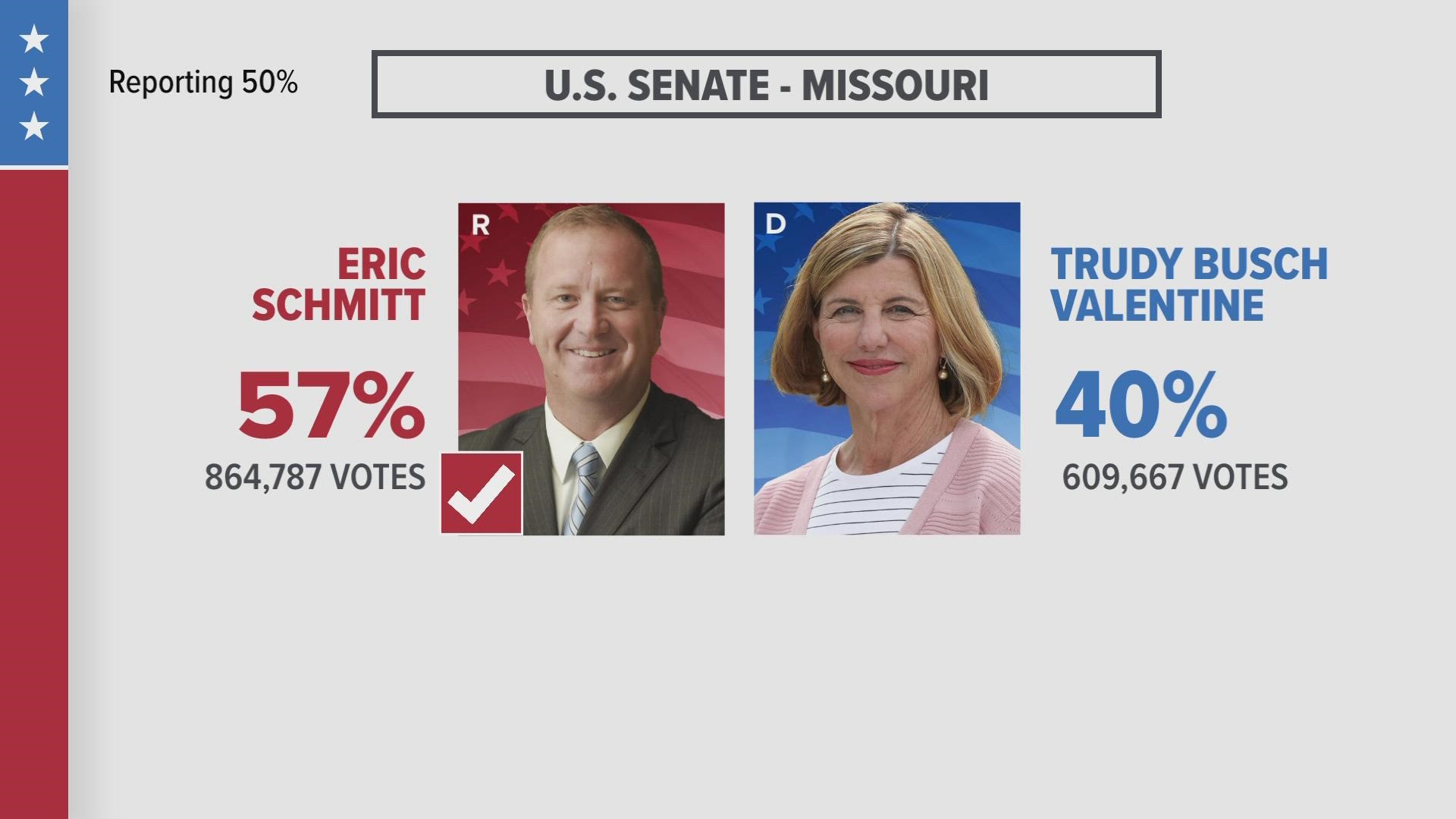O'FALLON, Mo. — Republican Missouri Attorney General Eric Schmitt won election to the U.S. Senate Tuesday, defeating Democrat Trudy Busch Valentine and keeping what’s considered a safe Republican seat in GOP hands as the party fought for control of the Senate.
Schmitt, 47, will take the seat occupied for the past 12 years by Republican Roy Blunt, who announced in March 2021 he would not seek a third term — ending a half-century career in politics.
For full election results throughout the night, click here.
Schmitt largely campaigned against Democratic President Joe Biden and inflation, characterizing Valentine during the campaign as an out-of-touch heiress who would side with the Democratic president over Missourians. Valentine’s campaign catchphrase was “nobody’s senator but yours,” and she slammed Schmitt for voting as a state senator to allow foreign ownership of farmland and over his support for the state’s ban on abortion.
Missouri was once a swing state but has become solidly Republican over the past decade. Valentine had plenty of money to spend — she’s the daughter of the late longtime Anheuser-Busch chairman, August Busch Jr. But she lacked name recognition and her campaign never gained momentum.
Schmitt himself has moved to the right since Gov. Mike Parson appointed him attorney general after Josh Hawley was elected to the U.S. Senate in 2018. As a state senator from suburban St. Louis, Schmitt earned a reputation as a moderate willing to work with Democrats. He was elected state treasurer in 2016.
As attorney general, he has filed dozens of lawsuits, many of which were criticized as politically-motivated. He sued school districts over mask mandates during the COVID-19 pandemic. He sued China over the origins of the pandemic, a case that was tossed out by a judge. And since Democrat Joe Biden defeated Republican Donald Trump in the 2020 presidential election, Schmitt has been involved in more than two dozen lawsuits against the federal government. Schmitt said it’s part of his responsibility as attorney general to stand up to what he views as “disastrous” federal policies.
Schmitt’s win in the general election followed a surprisingly easy win in what was expected to be a competitive Republican primary in August. That race also featured former Gov. Eric Greitens, U.S. Reps. Vicky Hartzler and Billy Long, and others.
Greitens’ presence in the race and early indications that he was doing well worried national Republicans, who feared he could win the primary but lose a seat in the general election as the party fought to regain control of the Senate. Greitens resigned in June 2018, a year-and-a-half into his first term, in the midst of investigations related to a sex scandal and campaign finance questions.
Greitens, Schmitt and others sought endorsement from former President Donald Trump, who did well in the state in 2016 and 2020. Trump eventually endorsed “Eric” without specifying which one.
Valentine, 65, is a nurse who ran on a pledge to return compassion to politics. She entered the Democratic primary late with a mostly self-funded campaign and edged Marine veteran Lucas Kunce in the August primary.
She spent millions of dollars of her own money in the general election campaign in an unsuccessful bid to turn around recent history in Missouri, where Republicans have become the dominant party.
The Senate race is one of two statewide offices up for grabs in Missouri. In the other, Republican Scott Fitzpatrick faces Democrat Alan Green in the race for auditor. Incumbent Auditor Nicole Galloway is not seeking reelection.
Fitzpatrick is currently state treasurer — at 35, Missouri’s youngest statewide elected official. His campaign platform includes a pledge to audit schools and curriculum to “ensure schools are following the law and keeping politically divisive curriculum like Critical Race Theory, and discussions relating to gender or sexual preferences out of the classroom,” according to his campaign website.
That pledge may be in conflict with the Missouri Constitution, which states no duty shall be imposed on the auditor “which is not related to the supervising and auditing of the receipt and expenditure of public funds.”
Green, of St. Louis County, is a former state representative, police officer and founder of a nonprofit. He wants to expand protections for whistleblowers who provide information about government fraud or waste.

